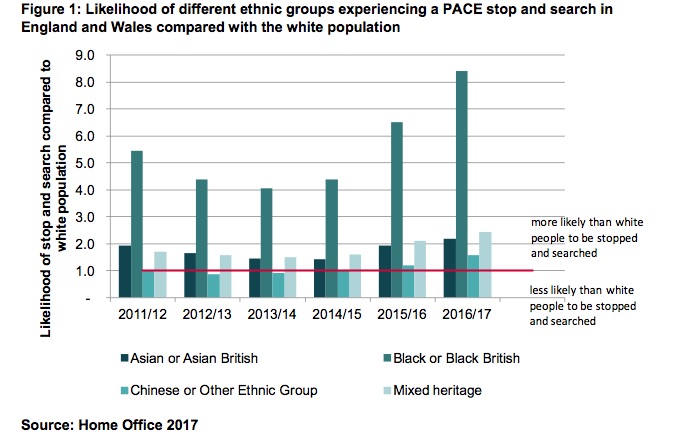Black people over eight times more likely to be stopped and searched than white people – but big holes in police data
Black people were over eight times more likely to be stopped and searched than white people, according to the latest report from the police watchdog which flags up a breakdown in recording of data on on ethnicity. Drugs searches on black people were significantly less likely to result in drugs being found than for white (33% for white and 26% for black), according to the HM Inspectorate of Constabulary’s annual police legitimacy report published yesterday.
The inspectorate noted that the disparity in find rates was ‘troubling’ and suggested that the use of stop and search on black people might be based on ‘weaker grounds for suspicion than its use on white people’. That finding taken together with the result that black people were ‘more than eight times more likely than white people to be stopped and searched’ required an explanation that the service was ‘currently unable to provide’, it added.
There was a clear breakdown in the recording of data on ethnic minority in some forces. Whilst the report noted that stop and search was used with ‘disproportionate frequency’ on BAME people, this was ‘not a new finding – therefore, we would expect forces to be monitoring data on this in their own areas carefully’.
In cases where the person did not state their ethnicity, an officer should record their own perception of the person’s ethnic background. The use of ‘not stated’ ranged widely from ‘1% to 31%’ between forces. Some forces monitored only ‘self-defined ethnicity’ and not ‘officer-defined ethnicity’. ‘This lack of consistent ethnicity recording could mean that the disparity between the stop and search rates for BAME people and for white people may be even higher than published at force and national levels,’ it noted.
The inspectorate found that the use of stop and search powers had been declining over recent years. The number of searches last year was about a quarter of that for 2011/12. It had fallen from 1.13 million to 301,000 last year.
The decrease was more marked for searches on white people (78% compared to 66% for black people). Five years ago black people were five times more likely to be stopped and searched than white people in England and Wales. The disparity had ‘the potential to erode public trust and confidence in the police… despite the reductions in the use of stop and search powers,’ the report noted.
The inspectorate looked of 8,574 records (almost 200 for each force) and found that 504 (6%) did not have reasonable grounds recorded. In 2013 inspection more than a quarter (27%) of records did not contain sufficient reasonable grounds to justify the lawful use of the power. According to the report, eight forces recorded more ‘more than 20 records without reasonable grounds recorded’. Northamptonshire was the only force with reasonable grounds recorded in all 199 searches assessed.
For the first time the watchdog looked at whether the circumstances of the stop and search were likely to have resulted in an arrest had the stop and search power not taken place. It reckoned that in 12% of occasions an arrest might have prevented an arrest. In almost one quarter of searches (23%) the item searched for was found. However this ranged from 3% to 39% between forces with only 16 forces scoring 25% plus.
Six out of 10 of the 8,574 records of stop and searches assessed were searches for drugs (61%). Of the drugs searches, seven out of 10 involved a suspicion of possession only (as opposed to ‘a supply-type offence’). ‘This finding suggests that in many cases, stop and search is still not being targeted towards tackling priority crimes,’ the watchdog noted. Some 787 records related to a search for weapons or firearms and items were found on 109 occasions.
In this year’s report, six forces were identified as requiring improvement and one one as ‘excellent’ (Kent). Mike Cunningham, who led this inspection, said the continuing over-representation of black people in stop and search figures was of ‘particular concern’. ‘Forces must be able to explain the reasons for any disparity in their stop and search figures if they are to enhance the trust and confidence of all communities,’ he said.







